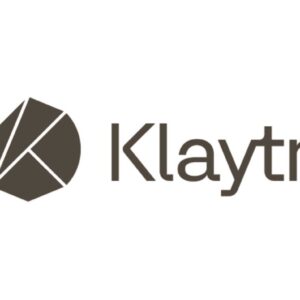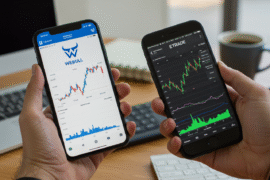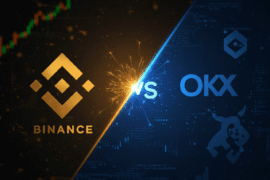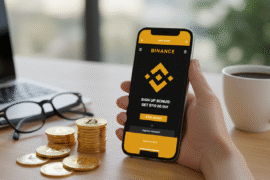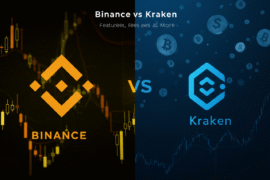This article may contain references to products or services from one or more of our advertisers or partners. We may receive compensation when you click on links to those products or services. Nonetheless, our opinions are our own.

Updated by Albert Fang
Who would not like to have less work to do certain activities, such as queues, bureaucratic things, or any other event that would require a few hours in a busy week? Undoubtedly, it is safe to affirm that 99% of people would opt for further efficiency.
Nowadays, there is a way to materialize this concept into real life. Blockchain technology promises to revolutionize ID verification, which will impact the functioning of entities such as banks, private companies, and notary offices.
In this article, you will discover how blockchain can open a gateway of new opportunities in terms of ID verification. And of course, this could bring you a better choice than going to purchase Bitcoin, like everyone else.
Blockchain Technology vs Digital Identity – An Introduction
Although many people are still not aware of the differences between blockchain and cryptocurrencies, there are several non-financial use cases for blockchain technology. For example, blockchain can improve the healthcare segment, as well as the healthcare system and digital identity.
The concept of blockchain-based digital identity can be applied to organizations, applications, devices, or even human beings. In this context, the term digital identity refers to a set of information that allows a specific person to prove their personal details.
Consequently, a digital identity can be used as a general validation for any identity. Plus, it can be used in situations where providing one’s ID confirmation is needed, such as medical records, voting, taxation, and border crossing.
How Privacy Breaches Can Be Attacks on Human Rights
As provided by the United Nations, every human being on the face of the earth has the right to have an identity. Typically, the term identity encompasses that right to have a name, date of birth, nationality, and a state identifier that varies from country to country (e.g., social security number).
Consequently, a person who has their identity confirmed has access to other rights, such as voting, working legally, or purchasing/selling and owning property.
All over the world, traditional government identity management is centralized. This way, most of the process of issuing and validating is exclusively performed by state-authorized entities.
For instance, if you want to use several social media platforms, you will need to create a profile for each one of them. By doing so, you are entrusting your personal data (name, phone number, email, etc.) to a third party, which can further relay your information to other third parties.
Hence, this process significantly reduces the level of control people have over their personal information. Also, all this information can be used for purposes that you thought were impossible, such as the Cambridge Analytica controversy.
For those unaware, the personal data of up to 87 million Facebook users were collected through 270,000 Facebook users via an app called “This Is Your Digital Life.” When users permitted the third-party app to acquire their data, the app used a breach to collect information from other users in the original user’s network.
Also, centralized systems are more exposed to identity theft. When people provide personal information such as passport numbers, tax ID numbers, or credit card details to a centralized third party, they are extremely prone to cyber-attacks. If a project could solve it, its cryptocurrency price would rise exponentially.
Blockchain Technology Offers Next-Level Solutions for ID Verification
Blockchain technology allows us to rely on an immutable distributed ledger that stores data with full transparency. This way, if a piece of data is not validated throughout the whole ledger (consensus), it is not accepted as part of its chain of blocks.
In essence, blockchains provide security by relying on data encryption. Blockchain technology also allows us to utilize Zero Knowledge Proof, which is a unique method of validating identity.
Through this method, instead of verifying the validity of the information, it is the validity of the attestor that is verified. By using Zero Knowledge Proof, it is possible to effectively prove information without disclosing it.
This innovative way of verifying data also guarantees trust between entities by allowing them to confirm any piece of data without revealing it. Plus, all data can be additionally secured by combining private and public keys in a decentralized manner.
Hence, it would be possible to verify and protect IDs at the same time, such as email addresses, date of birth, phone numbers, home addresses, passports, birth certificates, tax ID numbers, etc.
Final Thoughts
As it is plain to see, blockchain technology has the power to protect one’s private data while providing an efficient and seamless ID verification process.
While these much-welcome novelties are not part of the mainstream ID and notary system, it is crucial to spread the word and educate people about the new technologies designed to secure personal information.
This way, no one will have a problem when sharing an email address, date of birth, or a phone number, knowing that all their information is protected by encryption and Zero-Knowledge Proof.

Reviewed and edited by Albert Fang.
See a typo or want to suggest an edit/revision to the content? Use the contact us form to provide feedback.
At FangWallet, we value editorial integrity and open collaboration in curating quality content for readers to enjoy. Much appreciated for the assist.
Did you like our article and find it insightful? We encourage sharing the article link with family and friends to benefit as well - better yet, sharing on social media. Thank you for the support! 🍉
Article Title: The End of Paper Birth Certificates – How Blockchain Gives New Opportunities for ID Verification?
https://fangwallet.com/2021/08/26/the-end-of-paper-birth-certificates-how-blockchain-gives-new-opportunities-for-id-verification/The FangWallet Promise
FangWallet is an editorially independent resource - founded on breaking down challenging financial concepts for anyone to understand since 2014. While we adhere to editorial integrity, note that this post may contain references to products from our partners.
The FangWallet promise is always to have your best interest in mind and be transparent and honest about the financial picture.
Become an Insider

Subscribe to get a free daily budget planner printable to help get your money on track!
Make passive money the right way. No spam.
Editorial Disclaimer: The editorial content on this page is not provided by any of the companies mentioned. The opinions expressed here are the author's alone.
The content of this website is for informational purposes only and does not represent investment advice, or an offer or solicitation to buy or sell any security, investment, or product. Investors are encouraged to do their own due diligence, and, if necessary, consult professional advising before making any investment decisions. Investing involves a high degree of risk, and financial losses may occur including the potential loss of principal.
Source Citation References:
+ Inspo


